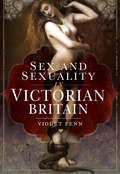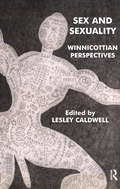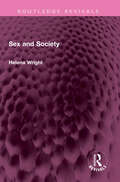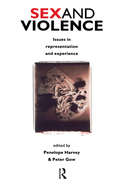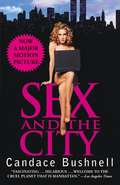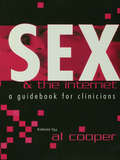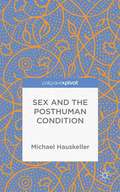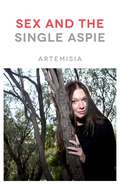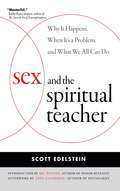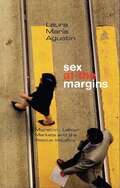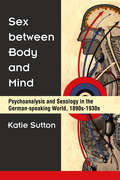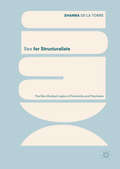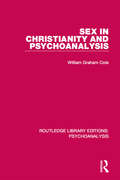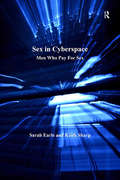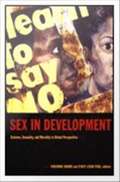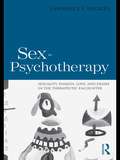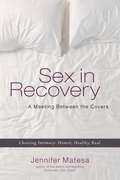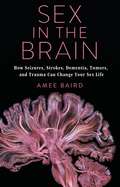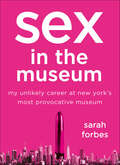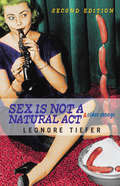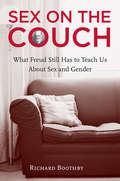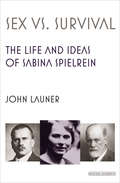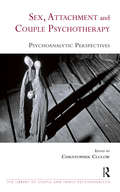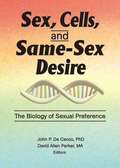- Table View
- List View
Sex and Sexuality in Victorian Britain
by Violet Fenn&“Dull this book is not, and it gives an insight into the many scandals not spoken about in polite Victorian drawing rooms.&” —Glasgow & West of Scotland Family History Society Peek beneath the bedsheets of nineteenth-century Britain in this affectionate, informative and fascinating look at sex and sexuality during the reign of Queen Victoria. It examines the prevailing attitudes towards male and female sexual behavior, and the ways in which these attitudes were often determined by those in positions of power and authority. It also explores our ancestors&’ ingenious, surprising, bizarre and often entertaining solutions to the challenges associated with maintaining a healthy sex life. Did the people in Victorian times live up to their stereotypes when it came to sexual behavior? This book will answer this question, as well as looking at fashion, food, science, art, medicine, magic, literature, love, politics, faith and superstition through a new lens, leaving the reader uplifted and with a new regard for the ingenuity and character of our great-great-grandparents. &“I would say this book gives you the information on relationships, genders and very much behavior that doesn&’t usually come across in history books. Therefore this is an excellent book indeed, certainly one that more people should be aware of and learn from.&” —UK Historian &“The writing is joyous and it is clear the author enjoys her subject and is fairly knowledgeable on things Victorian.&” —Rosie Writes &“Fenn&’s writing is so readable and it&’s clear this is a book written by a historian who loves her subject and is very knowledgeable about the research being carried out by other historians.&” —Jessticulates
Sex and Sexuality: Winnicottian Perspectives (The\winnicott Studies Monograph Ser.)
by Lesley Caldwell"Winnicott" and "sex" are two subjects that are rarely associated with one another. Sexuality is not a prominent theme within the work of Winnicott, who preferred to concentrate on the development of the self from infancy. However, his writings contain unexplored insights into sexuality and it is these hidden insights that prompted the author to invite papers from leading analysts to expand upon them. This collection provides a fresh and innovative look at the work of Winnicott and into sexuality, in particular infantile sexuality. The unusual link of Winnicott to Freud and to a psychoanalysis located in the drives encourages a different perspective into British psychoanalysis. Other diverse themes include a historical examination of Winnicott through the British Society; an exploration of the similarities between Laplanche and Winnicott; the use of Winnicott's work in the treatment of sexual dysfunction; and the interrelation between sexuality and play. This is the sixth volume in the Winnicott Studies Monograph Series.
Sex and Society (Routledge Revivals)
by Helena WrightFirst published in 1968, Sex and Society presents and analyses the code of sexual behaviour based on the universal use of contraceptive methods. It includes discussion of all forms of sexual activity, and emphasises in particular the attitudes that should be adopted in sex education. Backed up by case histories, and including details of reforms in abortion and homosexual law, this book sheds light on a topic which continues to cause concern in modern times. The author had been in active contact with all kinds of sexual problems for over thirty years in her professional clinic practice, and in her travels in India, Poland and Denmark teaching contraceptive techniques to doctors and nurses. Her experience as a Founder Member of the International Planned Parenthood Federation and participation in all the International and Regional Conferences gave her a very wide knowledge of sexual and social problems throughout the world. This book will be of interest to students of medicine, sexuality studies, psychology, gender studies, and health.
Sex and Violence: The Psychology of Violence and Risk Assessment
by Penelope HarveyProduced in response to the growing international demand for information, this book details the latest research in understanding and controlling violent and sexual offences. Increasing numbers of psychologists are now studying and working with offenders to the advancement of forensic psychology.Chapters cover contributions from ten different countries and are grouped into three sections dealing with risk assessment, sex offenders and offences and violent offenders and offences. The first section discusses the progress that has been made towards making accurate decisions about the risk that an individual poses to the community and emphasises the need to draw on both clinical experience and research.The second section explores understandings and investigations of sexual offences including discussion on: American commitment laws for sexually violent predators; the status of "recovered memories" in criminal trials; factors influencing delays in reporting sexual abuse; a model of rapists' accounts of their offences; and situational factors in sexual offending.The final section on violent offenders and offences includes discussion on: criminal careers; domestic violence; mutiliation-murder in Japan; offender profiling; and sentencing of homicide cases.This book will be of interest to scholars in criminology, psychology and forensic psychiatry and to policy-makers and practitioners who deal with sexual and violent offences.
Sex and the City
by Candace BushnellA columnist's examination of the celebrity affairs and sexual link indulged in by the members of high society is seen through the experiences of a troubled writer, a mega-businessman, a famous underwear model, and others.
Sex and the Internet: A Guide Book for Clinicians
by Al CooperFirst Published in 2002. Routledge is an imprint of Taylor & Francis, an informa company.
Sex and the Posthuman Condition
by Michael HauskellerThis book looks at how sexuality is framed in enhancement scenarios and how descriptions of the resulting posthuman future are informed by mythological, historical and literary paradigms. It examines the glorious sex life we will allegedly enjoy due to greater control of our emotions, improved capacity for pleasure, and availability of sex robots.
Sex and the Single Aspie
by ArtemisiaThis ground-breaking book about sexuality speaks to women on the autism spectrum in fresh new ways, opening doors to discussion, and blowing the lid off taboo subjects. One of the many problems women on the spectrum face is not always understanding how relationships and boundaries work for other people. This book provides answers, plus more that they may not even have thought to ask. Covering one night stands, the importance of safe sex, self-respect, and double standards, there is a wealth of information about the ethics and self-understanding involved in relationships. Written with humour and honesty, this is the go-to guide for sex on the spectrum.
Sex and the Spiritual Teacher
by Scott Edelstein Anne Katherine Mic HunterSex and the Spiritual Teacher looks at the complex of forces that tempt otherwise insightful, compassionate, and well-intentioned teachers to lose their way--and that tempt some of their students to lose their way as well. It analyzes why most of our current efforts to keep spiritual teachers from transgressing usually don't (and in fact can't) work. Perhaps most importantly, it suggests a set of practices and structures that can build community, encourage healthy student-teacher relationships, increase trust and spiritual intimacy between teachers and their students, and help authentic spiritual teachers stay happily monogamous or celibate. Sex and the Spiritual Teacher is for anyone who is or might become part of a spiritual community: students, teachers, clergy, lay leaders, and even casual visitors. It's a reader-friendly, no-nonsense guide to making spiritual life safer and fuller for all of us one person, relationship, and community at a time.
Sex at the Margins
by Laura María AgustinThis groundbreaking book explodes several myths: that selling sex is completely different from any other kind of work; that migrants who sell sex are passive victims; and that the multitude of people out to save them are without self-interest. <p><p> Laura Agustín makes a passionate case against these stereotypes, arguing that the label 'trafficked' does not accurately describe migrants' lives and that the 'rescue industry' disempowers them. Based on extensive research amongst migrants who sell sex and social helpers, Sex at the Margins provides a radically different analysis. Frequently, says Agustín, migrants make rational choices to travel and work in the sex industry. Although they are treated like a marginalised group they form part of the dynamic global economy. <p> Both powerful and controversial, this book is essential reading for all those who want to understand the increasingly important relationship between sex markets, migration and the desire for social justice.
Sex between Body and Mind: Psychoanalysis and Sexology in the German-speaking World, 1890s-1930s (Social History, Popular Culture, And Politics In Germany)
by Katie SuttonIdeas about human sexuality and sexual development changed dramatically across the first half of the 20th century. As scholars such as Magnus Hirschfeld, Iwan Bloch, Albert Moll, and Karen Horney in Berlin and Sigmund Freud, Wilhelm Stekel, and Helene Deutsch in Vienna were recognized as leaders in their fields, the German-speaking world quickly became the international center of medical-scientific sex research—and the birthplace of two new and distinct professional disciplines, sexology and psychoanalysis. This is the first book to closely examine vital encounters among this era’s German-speaking researchers across their emerging professional and disciplinary boundaries. Although psychoanalysis was often considered part of a broader “sexual science,” sexologists increasingly distanced themselves from its mysterious concepts and clinical methods. Instead, they turned to more pragmatic, interventionist therapies—in particular, to the burgeoning field of hormone research, which they saw as crucial to establishing their own professional relevance. As sexology and psychoanalysis diverged, heated debates arose around concerns such as the sexual life of the child, the origins and treatment of homosexuality and transgender phenomena, and female frigidity. This new story of the emergence of two separate approaches to the study of sex demonstrates that the distinctions between them were always part of a dialogic and competitive process. It fundamentally revises our understanding of the production of modern sexual subjects.
Sex for Structuralists: The Non-Oedipal Logics of Femininity and Psychosis
by Shanna de la TorreThis book argues that structuralism makes itself useful when it engages with the non-Oedipal logics of femininity and psychosis. Building from the psychoanalytic belief that norms repress unconscious desire while structures open onto the creative resources of the symbolic, Sex for Structuralists looks to key texts in myth, trauma, and unconscious fantasy by Sigmund Freud, Jacques Lacan, and Claude Lévi-Strauss. It also examines innovative writings by contemporary Lacanian thinkers in order to discover what becomes of structuralism when the ground upon which it ostensibly stands (namely, that of the zero symbol or the incest prohibition) drops out from under it.
Sex in Christianity and Psychoanalysis (Routledge Library Editions: Psychoanalysis #6)
by William Graham ColeOriginally published in 1956, this survey of the interpretations of sex by the major figures in Christian thought and in psychoanalysis made an important contribution to the re-thinking of our sexual morality at the time. The author refutes the common belief that the negative attitude toward sex and the body, which had been predominant in western civilization, originated with Christianity. He shows that such a viewpoint was widespread in the early Hellenism Age, nearly three centuries before Christ. He emphasizes the essentially positive view which Biblical religion demands and shows how Christianity’s attitude early became corrupted by the dualism of the Orient. He points to the need for a return to essential naturalism and the Biblical interpretation of sex. The first part of the book consists of a historical treatment in the Christian tradition, touching upon the teaching of Jesus, Paul, Augustine, Aquinas, Luther, Calvin and others. He analyses the classical and contemporary attitudes and ideas in both Catholic and Protestant circles and shows how Christian understanding comes into conflict with psychoanalysis. In the later portions of the book the author discusses sex and psychoanalysis and the major problems in sexual mores. He ends with a synthesis of the religious and psychoanalytic points of view and a critical reconstruction of a Christian interpretation.
Sex in Cyberspace: Men Who Pay For Sex
by Sarah Earle Keith SharpSex in Cyberspace offers a bold and provocative, yet sensitively written, account of an under-investigated area of sociological enquiry. While there is a considerable amount of research documenting the experiences of sex workers, very little data exists on their male clientele. The first empirically-based volume on the experiences of men who pay for sex, this work presents a significant new source of data. The book is based upon an extensive study of on-line forums in which both the purchasers of sexual services and the workers themselves can exchange information and views - information which is otherwise extremely difficult to obtain. Sarah Earle and Keith Sharp argue that such sites represent a significant change in the social organization of sex work and those who seek and use the services of sex workers. Shedding new light on men's sexual identity, Sex in Cyberspace makes a major contribution to the study of sexuality.
Sex in Development: Science, Sexuality, and Morality in Global Perspective
by Vincanne Adams Stacy Leigh PiggSex in Development examines how development projects around the world intended to promote population management, disease prevention, and maternal and child health intentionally and unintentionally shape ideas about what constitutes "normal" sexual practices and identities. From sex education in Uganda to aids prevention in India to family planning in Greece, various sites of development work related to sex, sexuality, and reproduction are examined in the rich, ethnographically grounded essays in this volume. These essays demonstrate that ideas related to morality are repeatedly enacted in ostensibly value-neutral efforts to put into practice a "global" agenda reflecting the latest medical science. Sex in Development combines the cultural analysis of sexuality, critiques of global development, and science and technology studies. Whether considering the resistance encountered by representatives of an American pharmaceutical company attempting to teach Russian doctors a "value free" way to offer patients birth control or the tension between Tibetan Buddhist ideas of fertility and the modernization schemes of the Chinese government, these essays show that attempts to make sex a universal moral object to be managed and controlled leave a host of moral ambiguities in their wake as they are engaged, resisted, and reinvented in different ways throughout the world. Contributors. Vincanne Adams, Leslie Butt, Lawrence Cohen, Heather Dell, Vinh-Kim Nguyen, Shanti Parikh, Heather Paxson, Stacy Leigh Pigg, Michele Rivkin-Fish
Sex in Peace Operations
by Gabrielle SimmGabrielle Simm's critical re-evaluation of sex between international personnel and local people examines the zero-tolerance policy on sexual exploitation and abuse and its international legal framework. Whereas most preceding studies of the issue have focused exclusively on military peacekeepers, Sex in Peace Operations also covers the private military contractors and humanitarian NGO workers who play increasingly important roles in peace operations. Informed by socio-legal studies, Simm uses three case studies (Bosnia, West Africa and the Democratic Republic of the Congo) to illustrate the extent of the problem and demonstrate that the problems of impunity for sexual crimes are not just a failure of political will but the result of the structural weaknesses of international law in addressing non-state actors. Combining the insights of feminist critique with a regulatory approach to international law, her conclusions will interest scholars of international law, peace and conflict studies, gender and sexuality, and development.
Sex in Psychotherapy: Sexuality, Passion, Love, and Desire in the Therapeutic Encounter
by Lawrence E. HedgesSex in Psychotherapy takes a psychodynamic approach to understanding recent technological and theoretical shifts in the field of psychotherapy. Lawrence Hedges provides an expert overview and analysis of a wide variety of new perspectives on sex, sexuality, gender, and identity; new theories about sex’s role in therapy; and new discoveries about the human brain and how it works. Therapists will value Hedges’s unique insights into the role of sexuality in therapy, which are grounded in the author’s studies of neurology, the history of sexuality, transference, resistance, and countertransference. Clinicians will also appreciate his provocative analyses of influential perspectives on sex, gender, and identity, and his lucid, concrete advice on the practice of therapeutic listening.
Sex in Recovery: A Meeting Between the Covers
by Jennifer MatesaHealthy sexuality within the context of recovery is rarely talked about openly, in part because the larger culture restricts the space required to name our experiences in open, honest ways. Matesa gives us that space by bringing the language of recovery to this more hidden part of our healing, allowing us to truly “practice these principles in all our affairs."Sexuality in the context of recovery is rarely talked about openly, in part because our broader culture may inhibit us from sharing our true experiences. For some, the prospect of sober sex feels like uncharted waters—in the past, we’ve rarely had sex without first numbing ourselves with drugs and alcohol. What does it mean to have an intimate relationship in sobriety? Exploring that question deepens our recovery journey.With this groundbreaking work, Jennifer Matesa uncovers the challenges real people encounter when they start taking their clothes off—without drinking or using in order to do so. Providing readers “a meeting between the covers,” Matesa blends first-person accounts bravely shared by diverse members of the recovery community, insights from experts, and her own perspectives. The result is a book that creates a space for a vital, new dialogue about sexuality and intimacy. As we find a common language for this more hidden aspect of our healing, we can truly “practice these principles in all our affairs.”
Sex in the Brain: How Seizures, Strokes, Dementia, Tumors, and Trauma Can Change Your Sex Life
by Amee BairdWhat controls our sex lives? Our brains. Yet there is surprisingly little research into how our brains influence one of the most fundamental of all human behaviors. And there is even less understanding of what can happen to the sexuality of a person who suffers a brain injury or illness such as a stroke, Parkinson’s disease, or dementia.In Sex in the Brain, clinical neuropsychologist Amee Baird explores fascinating case studies of dramatic changes in sexual behavior and explains what these exceptional stories have to say about human sexuality. She illuminates the extraordinary insights into how the brain works that injury or disease can divulge. Each chapter includes striking personal accounts, many from individuals Baird has met in her clinical practice, of unexpected shifts in sexuality. Until now these fascinating, frightening, and funny stories have been hidden in medical journals or untold outside of the clinical setting. This revealing and sometimes heartbreaking book unfolds a better understanding of the links between brain function and our sexual selves.
Sex in the Museum: My Unlikely Career at New York's Most Provocative Museum
by Sarah ForbesSarah Forbes was in graduate school when she stumbled upon a museum dedicated to . . . sex. The anthropology student hesitated when her boyfriend suggested she apply for a job, but apply she did, and it wasn’t long before a part-time position at New York’s MUSEUM OF SEX lead to a gig as the museum's curator. That was over twelve years ago. Now Sarah—a married mother of two—proudly sports her title as Curator of Sex. In SEX IN THE MUSEUM, Sarah invites readers to travel from suburban garages where men and women build sex machines, to factories that make sex toys, to labyrinthine archives of erotica collectors. Escorting us in to the hidden world of sex, illuminating the never-talked-about communities and eccentricities of our sexual subcultures, and telling her own personal story of a decade at The Museum of Sex, Sarah asks readers to grapple with the same questions she did: when it comes to sex, what is good, bad, deviant, normal? Do such terms even apply? If everyone has sexual secrets, is it possible to really know another person and be known by them? And importantly, in our hyper-sexualized world, is it still possible to fall in love?
Sex is not a Natural Act and Other Essays
by Leonore TieferRevisits and updates the centrality of the social construction of sexuality, especially in the age of Viagra, FSD (female sexual dysfunction) and the media saturation of sex. Leonore Tiefer is one of the foremost sexologists working in the United States today; she is a well-known and respected scholar who writes engagingly and humorously about a wide array of topics in sexuality to appeal to both students and general readers. Revised and updated with new pieces on the medicalization of sex, FSD (female sexual dysfunction) and the politics of sex, as well as classic pieces found in the original edition, such as Am I Normal?: The Question of Sex.
Sex on the Couch: What Freud Still Has To Teach Us About Sex and Gender
by Richard BoothbyFirst published in 2006. Routledge is an imprint of Taylor & Francis, an informa company.
Sex vs. Survival: The Life and Ideas of Sabina Spielrein
by John Launer&“An impressively researched, documented, and readable biography&” of a woman who played a key role in the history of psychology (Library Journal, starred review). Who was Sabina Spielrein? She is probably best known for her notorious affair with Carl Jung, which was dramatized in the film A Dangerous Method, starring Keira Knightley. Yet her life story is much more compelling than just one famous relationship. Spielrein overcame family and psychological abuse to become a profoundly original thinker in her own right. Sex vs. Survival is the first biography to put her life and ideas at the center of the story and examine Spielrein&’s key role in the development of psychoanalysis. Drawing on fresh research into Spielrein&’s diaries, papers, and correspondence, John Launer shows how Spielrein&’s overlooked ideas―rejected by Freud and Jung but substantially vindicated by later developments in psychology and evolutionary biology—may represent the last and most important stage in the rediscovery of an extraordinary life. &“An invaluable resource for understanding Spielrein&’s significance, her progressive thinking, and her groundbreaking contributions to the history of psychoanalysis.&” —Publishers Weekly &“By the end of Launer&’s account, there&’s no mistaking what the founding fathers of analysis did to this particular founding mother—and probably to many other women. At least this biography offers Spielrein some retrospective justice.&” —Jewish Book World
Sex, Attachment and Couple Psychotherapy: Psychoanalytic Perspectives (The Library of Couple and Family Psychoanalysis)
by Christopher ClulowThe contributors to this book have drawn on different mentors to provide a framework for understanding the sexual problems of the couples they see, and to inform the work they do. But whether Freud, Jung, Klein or Bowlby has been the progenitor of their own particular therapeutic narrative, the spirit of enquiry and curiosity is evident in their approach. This has created space to explore the dimensions of sex, love, hate and power in ways that allow the facts of life to emerge and be discovered as something unique and authentic to each couple. It has also created a platform from which new understandings may emerge to inform practice in the future.
Sex, Cells, and Same-Sex Desire: The Biology of Sexual Preference
by David A ParkerThis fascinating new book explores the myriad aspects of biological theories of sexual preference. Sex, Cells, and Same-Sex Desire describes, reviews, and questions recent biological research on sexual preference from the point of view of knowledgeable scientists and of scholars in the social sciences and humanities representing the emerging field of gay studies. The issues involved have a vibrant history, are wide-ranging, and remain the objects of much controversy. This book demystifies biological research on sexual preference and makes it accessible to readers unfamiliar with biological and medical research.Sex, Cells, and Same-Sex Desire is divided into several sections, each of which is introduced by an explanation of key concepts and terms found in that section. The book begins with a discussion of the history of biological theories and sociocultural concepts of gender and sexuality. The next 3 sections explore specialized areas of biological science and related issues: genetics and evaluation, hormones and the endocrine system, and brain physiology and structure. A final section discusses social stigma, science, and medicine. A glossary of terms used by the authors is included, so readers may look up those that may be unfamiliar.
